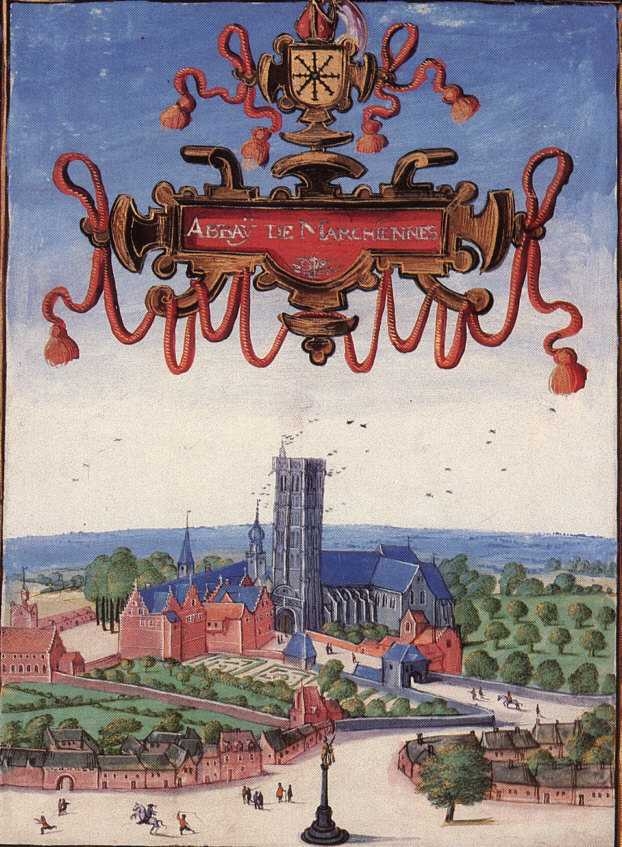Rictrude on:
[Wikipedia]
[Google]
[Amazon]
 Rictrude (Rictrudis, Richtrudis, Richrudis) (c. 614–688) was abbess of Marchiennes Abbey, in
Rictrude (Rictrudis, Richtrudis, Richrudis) (c. 614–688) was abbess of Marchiennes Abbey, in
/ref> She married Adalbard, Duke of Douai, despite the opposition of some members of her family. In Hucbald's account, this is shown deliberately as a model marriage. It is unclear whether she had four or five children. Her four known children were: Clotsinda, successor as abbess, Adalsinda, Eusebia and Maurantius. The couple opened their castle to the poor and disadvantaged. The hermit-monk Richarius was a family friend. Around the year 630, Adalbald founded Marchiennes Abbey, on the advice of Amandus of Maastricht. In 643, Rictrude made it a double monastery. Adalbard was murdered in obscure circumstances around 652, near Périgueux during a subsequent expedition to Aquitaine, probably by his wife's relatives still bitter about the marriage to an enemy of her people. After her husband's death, Rictrude resisted royal pressure to remarry and retired to Marchiennes Abbey, with her daughters and became abbess. In this she was supported by Amandus, Abbot of Elnon. Rectrude died in 688. Rictrude is recognized as a Catholic saint; her feast day is 12 May. As a pre-1054 Great (East-West) Schism Western Saint she is thus also recognised as a Saint by the Orthodox Church and the
"30 Juin", Orthodoxie
/ref>
Flanders
Flanders ( or ; ) is the Dutch language, Dutch-speaking northern portion of Belgium and one of the communities, regions and language areas of Belgium. However, there are several overlapping definitions, including ones related to culture, la ...
. The main early source for her life is the ''Vita Rictrudis'', commissioned by the abbey, and written in 907 by Hucbald.
Life
She was from a noble family inGascony
Gascony (; ) was a province of the southwestern Kingdom of France that succeeded the Duchy of Gascony (602–1453). From the 17th century until the French Revolution (1789–1799), it was part of the combined Province of Guyenne and Gascon ...
, the daughter of Ernoldo, lord of Toulouse."Sant 'Adalbaldo", Santi e Beati, November 1, 2008/ref> She married Adalbard, Duke of Douai, despite the opposition of some members of her family. In Hucbald's account, this is shown deliberately as a model marriage. It is unclear whether she had four or five children. Her four known children were: Clotsinda, successor as abbess, Adalsinda, Eusebia and Maurantius. The couple opened their castle to the poor and disadvantaged. The hermit-monk Richarius was a family friend. Around the year 630, Adalbald founded Marchiennes Abbey, on the advice of Amandus of Maastricht. In 643, Rictrude made it a double monastery. Adalbard was murdered in obscure circumstances around 652, near Périgueux during a subsequent expedition to Aquitaine, probably by his wife's relatives still bitter about the marriage to an enemy of her people. After her husband's death, Rictrude resisted royal pressure to remarry and retired to Marchiennes Abbey, with her daughters and became abbess. In this she was supported by Amandus, Abbot of Elnon. Rectrude died in 688. Rictrude is recognized as a Catholic saint; her feast day is 12 May. As a pre-1054 Great (East-West) Schism Western Saint she is thus also recognised as a Saint by the Orthodox Church and the
True Orthodox Church
True Orthodox church, True Orthodox Christians, True Orthodoxy or Genuine Orthodoxy, often pejoratively "Zealotry", are groups of traditionalist Eastern Orthodox churches which since the 1920s have severed communion with the mainstream Eastern Ort ...
, and is additionally celebrated on 30 June in their liturgical calendars. Her four children are also saints.
Clotsinda
Born around 638, Clotsinda was a younger daughter of Rictrude and Adalbard duke ofDouai
Douai ( , , ; ; ; formerly spelled Douay or Doway in English) is a city in the Nord (French department), Nord département in northern France. It is a Subprefectures in France, sub-prefecture of the department. Located on the river Scarpe (rive ...
, In 688, she succeeded her mother as the second abbess of the double monastery of Marchiennes Abbey. She died around 714.
Her siblings Maurontius, Adalsinda and Eusebia are also honored as saints.
Her feast day is of May 5; Closinda is especially venerated in Douai
Douai ( , , ; ; ; formerly spelled Douay or Doway in English) is a city in the Nord (French department), Nord département in northern France. It is a Subprefectures in France, sub-prefecture of the department. Located on the river Scarpe (rive ...
. In the Orthodox faith, she is commemorated on June 30./ref>
References
Sources
*Jo Ann McNamara, John E. Halborg, E. Gordon Whatley (1992), ''Sainted Women of the Dark Ages'', pp. 195–219 {{Authority control 688 deaths 7th-century Frankish saints 7th-century Frankish women Year of birth unknown Christian female saints of the Middle Ages Colombanian saints